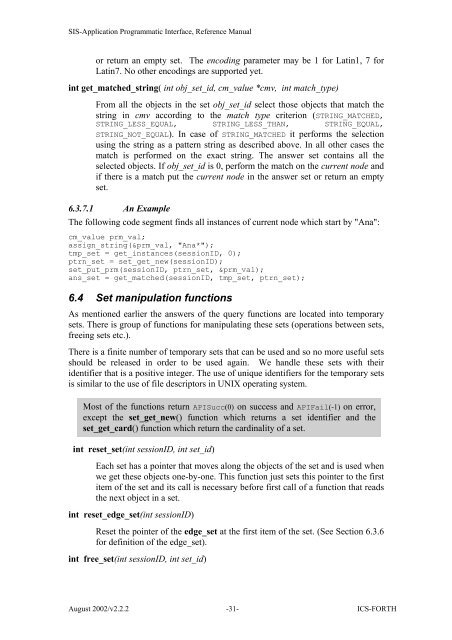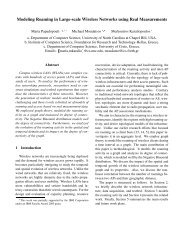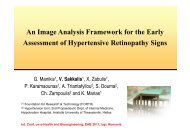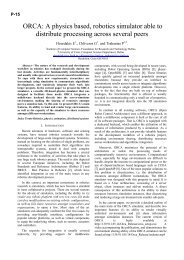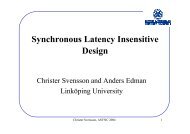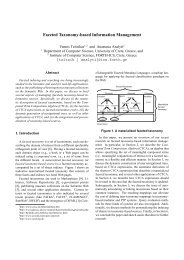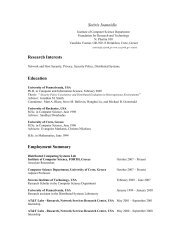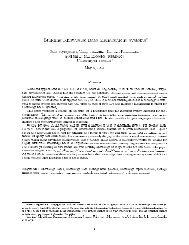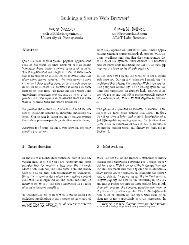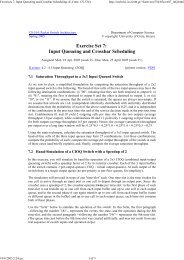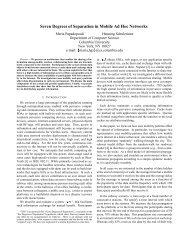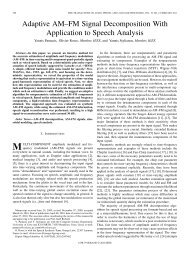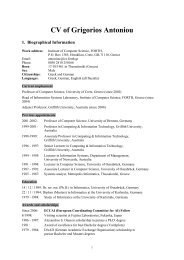SIS - Application Programmatic Interface, Reference Manual - ICS ...
SIS - Application Programmatic Interface, Reference Manual - ICS ...
SIS - Application Programmatic Interface, Reference Manual - ICS ...
Create successful ePaper yourself
Turn your PDF publications into a flip-book with our unique Google optimized e-Paper software.
<strong>SIS</strong>-<strong>Application</strong> <strong>Programmatic</strong> <strong>Interface</strong>, <strong>Reference</strong> <strong>Manual</strong><br />
or return an empty set. The encoding parameter may be 1 for Latin1, 7 for<br />
Latin7. No other encodings are supported yet.<br />
int get_matched_string( int obj_set_id, cm_value *cmv, int match_type)<br />
From all the objects in the set obj_set_id select those objects that match the<br />
string in cmv according to the match type criterion (STRING_MATCHED,<br />
STRING_LESS_EQUAL, STRING_LESS_THAN, STRING_EQUAL,<br />
STRING_NOT_EQUAL). In case of STRING_MATCHED it performs the selection<br />
using the string as a pattern string as described above. In all other cases the<br />
match is performed on the exact string. The answer set contains all the<br />
selected objects. If obj_set_id is 0, perform the match on the current node and<br />
if there is a match put the current node in the answer set or return an empty<br />
set.<br />
6.3.7.1 An Example<br />
The following code segment finds all instances of current node which start by "Ana":<br />
cm_value prm_val;<br />
assign_string(&prm_val, "Ana*");<br />
tmp_set = get_instances(sessionID, 0);<br />
ptrn_set = set_get_new(sessionID);<br />
set_put_prm(sessionID, ptrn_set, &prm_val);<br />
ans_set = get_matched(sessionID, tmp_set, ptrn_set);<br />
6.4 Set manipulation functions<br />
As mentioned earlier the answers of the query functions are located into temporary<br />
sets. There is group of functions for manipulating these sets (operations between sets,<br />
freeing sets etc.).<br />
There is a finite number of temporary sets that can be used and so no more useful sets<br />
should be released in order to be used again. We handle these sets with their<br />
identifier that is a positive integer. The use of unique identifiers for the temporary sets<br />
is similar to the use of file descriptors in UNIX operating system.<br />
Most of the functions return APISucc(0) on success and APIFail(-1) on error,<br />
except the set_get_new() function which returns a set identifier and the<br />
set_get_card() function which return the cardinality of a set.<br />
int reset_set(int sessionID, int set_id)<br />
Each set has a pointer that moves along the objects of the set and is used when<br />
we get these objects one-by-one. This function just sets this pointer to the first<br />
item of the set and its call is necessary before first call of a function that reads<br />
the next object in a set.<br />
int reset_edge_set(int sessionID)<br />
Reset the pointer of the edge_set at the first item of the set. (See Section 6.3.6<br />
for definition of the edge_set).<br />
int free_set(int sessionID, int set_id)<br />
August 2002/v2.2.2 -31- <strong>ICS</strong>-FORTH


